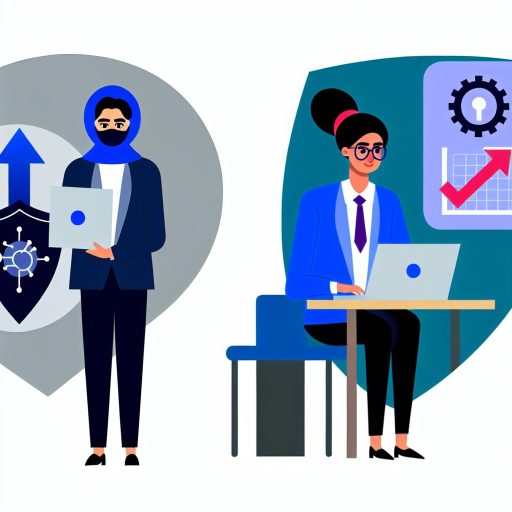Understanding Fundamental Cybersecurity Concepts and Principles
Core Concepts of Cybersecurity
Cybersecurity protects information systems from unauthorized access and attacks.
It ensures confidentiality.
It ensures integrity.
It ensures availability of data at all times.
Additionally, cybersecurity involves identifying threats effectively.
It also involves preventing threats effectively.
It involves responding to threats effectively.
New Zealand companies like KiwiSecure Solutions emphasize these principles for safety.
Importance of Risk Management
Risk management helps identify potential vulnerabilities in digital infrastructure.
Effective risk assessment minimizes the impact of cyber threats on operations.
Security analyst Megan Turner from Wellington Tech advocates continuous risk evaluation.
Moreover, organizations implement strategies to reduce their digital risks.
Also, they implement strategies to transfer their digital risks.
Understanding Threats and Vulnerabilities
Recognizing various cyber threats is crucial for proactive defense.
Threat examples include malware.
Personalized Career Consulting
Unlock your potential with expert career advice tailored to your goals. Get personalized guidance and actionable steps toward your dream career in New Zealand.
Get StartedThey include phishing.
They include ransomware.
They also include insider attacks.
Professional James Ngata points out that understanding system weaknesses strengthens defense.
Furthermore, experts perform regular audits to detect vulnerabilities promptly.
They also fix vulnerabilities promptly.
Role of Cybersecurity Policies and Procedures
Clear policies guide employees on safe online practices.
They also guide employees on incident reporting.
Companies like Aotearoa Cyber Consulting develop tailored cybersecurity frameworks.
Regular training ensures staff stay updated on evolving cyber threats.
Also, enforcing policies reduces risks of accidental breaches significantly.
Integration of Security Technologies
Utilizing firewalls forms a strong defense.
Encryption also forms a strong defense.
Intrusion detection systems form a strong defense.
Transform Your Career with a Professional CV and Cover Letter
Stand out to employers with an ATS-optimized resume and tailored cover letter designed to match your dream role. Let us craft your job application materials for success!
Get StartedTechnology specialist Laura Rangi highlights encryption’s role in safeguarding sensitive data.
Organizations adopt multi-factor authentication to enhance access control.
Ultimately, combining technologies with human vigilance creates a resilient cybersecurity posture.
Proficiency in Network Security and Infrastructure Protection
Fundamentals of Network Security
Network security forms the backbone of any cybersecurity strategy.
Professionals must understand how data travels through networks securely.
They should be familiar with firewalls, VPNs, and intrusion detection systems.
Moreover, knowledge of encryption protocols is essential to protect sensitive information.
Without these basics, infrastructure vulnerabilities often lead to security breaches.
Securing Infrastructure Components
Cybersecurity experts must safeguard hardware devices such as routers and switches.
Software configurations of infrastructure components require regular updates and patches.
They also need to monitor endpoints like servers and workstations continuously.
Additionally, threat intelligence tools help identify potential risks proactively.
Effective security combines technology with vigilant management of all network elements.
Implementation of Access Controls
Access controls ensure that only authorized users access network resources.
Boost Your Career with a Standout LinkedIn Profile
Attract recruiters and expand your network with a fully optimized LinkedIn profile tailored to highlight your strengths and professional goals. Let your profile open doors to new opportunities!
Get OptimizedTechniques like role-based access control and multi-factor authentication increase security.
Professionals must configure permissions carefully to minimize insider threats.
Continuous auditing of access logs helps detect unusual activities promptly.
Therefore, strong access controls form a critical layer of defense in cybersecurity.
Incident Response and Mitigation
Cybersecurity specialists must have skills in quickly identifying security incidents.
They should implement procedures to isolate and contain network threats immediately.
Effective incident response reduces damage and accelerates system recovery.
Post-incident analysis helps improve future response strategies and security measures.
Thus, rapid and thorough actions determine the resilience of network infrastructure.
Continuous Learning and Adaptation
The cybersecurity landscape evolves rapidly with new threats emerging constantly.
Professionals must stay updated on the latest tools, techniques, and vulnerabilities.
Attending workshops and certifications helps maintain relevant skill sets.
Adapting to changing technologies ensures robust protection of network infrastructure.
Consequently, ongoing education is vital for success in cybersecurity careers.
Skills in Ethical Hacking and Penetration Testing
Understanding Ethical Hacking Principles
Ethical hacking involves identifying security weaknesses legally and responsibly.
Experts like Sarah McKenzie emphasize the importance of integrity in testing.
Furthermore, ethical hackers must respect privacy and follow legal guidelines.
This skill ensures businesses like CyberGuard Solutions protect critical data.
Consequently, companies avoid breaches and maintain customer trust.
Mastering Penetration Testing Techniques
Penetration testing simulates cyberattacks to reveal system vulnerabilities.
Professionals such as Liam O’Connor use tools like Metasploit and Burp Suite.
Moreover, they conduct thorough assessments of network, application, and physical security.
Regular practice with hands-on labs sharpens their practical skills.
Therefore, penetration testers help organizations strengthen defenses effectively.
Key Technical Skills Required
- Proficiency in programming languages such as Python, JavaScript, and Ruby.
- In-depth knowledge of operating systems including Linux and Windows.
- Understanding of network protocols like TCP/IP and HTTP.
- Familiarity with web application vulnerabilities like SQL injection and XSS.
- Experience in using vulnerability scanners and exploitation frameworks.
Developing Analytical and Problem-Solving Abilities
Successful ethical hackers like Emily Zhang analyze complex systems critically.
They identify weak points by connecting seemingly unrelated information.
In addition, problem-solving skills enable rapid adaptation to evolving threats.
They also create innovative solutions to strengthen security measures.
Thus, these abilities are vital in dynamic cybersecurity environments.
Gaining Industry Certifications and Continuous Learning
Certifications such as CEH and OSCP validate expertise in ethical hacking.
James Falconer advises pursuing these credentials for career growth.
Additionally, staying updated with emerging threats is essential.
Professionals attend conferences and participate in cybersecurity communities.
This commitment ensures they remain effective in defending against attacks.
Gain More Insights: The Impact of AI on Software Development Jobs in New Zealand
Knowledge of Security Compliance and Regulatory Frameworks in New Zealand
Understanding New Zealand’s Cybersecurity Landscape
New Zealand has developed robust cybersecurity laws to protect businesses and individuals.
The Privacy Act 2020 plays a critical role in regulating data protection requirements.
The Act mandates strict guidelines on how organizations must handle personal information.
Similarly, the Harmful Digital Communications Act focuses on reducing online harm and abuse.
Professionals must be familiar with these frameworks to design compliant security strategies.
Key Regulatory Bodies and Standards
The New Zealand Information Security Manual guides organizations on security best practices.
Furthermore, the Government Communications Security Bureau enforces national security policies.
Additionally, standards like ISO/IEC 27001 help organizations manage information security risks.
Knowledge of these standards ensures cybersecurity measures meet global and local expectations.
Experts work closely with agencies such as the Privacy Commissioner for compliance oversight.
Practical Compliance Skills in Cybersecurity Roles
Cybersecurity professionals must interpret and apply relevant laws in everyday operations.
They should conduct regular audits to verify adherence to compliance requirements.
Also, they need to stay updated on legislative changes affecting digital security.
Effective communication skills help them explain compliance needs to diverse teams.
Thus, understanding legal frameworks directly strengthens the security posture of organizations.
Integrating Compliance into Security Policies
Security policies must reflect the current regulatory requirements of New Zealand.
Experts like Emma Fletcher at Titan Cyber advise on aligning policies with legal standards.
Policies typically cover data handling, breach notifications, and user access controls.
Moreover, embedding compliance into technology and process designs reduces future risks.
Companies with strong compliance awareness avoid costly fines and reputational damage.
Explore Further: The Rise of Cloud Computing Careers in New Zealand
Ability to Analyze and Respond to Cybersecurity Threats and Incidents
Recognizing and Assessing Threats
Cybersecurity professionals must quickly identify potential threats to protect digital assets.
They analyze unusual activity patterns and suspicious network behavior effectively.
Moreover, understanding threat intelligence feeds strengthens proactive security measures.
Training at companies like Taranaki Cyber Defense emphasizes these crucial recognition skills.
Incident Response and Management
Responding promptly to incidents limits damage and reduces recovery time.
Teams led by experts such as Hannah Mitchell coordinate containment and eradication efforts.
They follow structured response plans aligned with New Zealand’s cybersecurity frameworks.
Additionally, documenting incidents helps improve strategies for future threats.
Utilizing Tools and Technologies
Specialists operate advanced software to monitor systems and detect breaches.
They leverage platforms including Security Information and Event Management (SIEM) effectively.
Furthermore, automation tools assist in accelerating incident detection and response.
Organizations like Wellington Technologies invest heavily in such cybersecurity tools.
Continuous Learning and Adaptation
Cyber threats evolve rapidly, requiring constant skill upgrades.
Ethan Green, a cybersecurity analyst in Auckland, attends regular training sessions.
He adapts response techniques to emerging threats and new attack vectors swiftly.
Consequently, staying informed ensures resilience against sophisticated cyberattacks.
See Related Content: How Artificial Intelligence Is Changing IT Careers in NZ
Expertise in Encryption Technologies and Data Protection
Understanding Encryption Fundamentals
Encryption transforms readable data into an unreadable format to protect information.
Cybersecurity professionals must know symmetric and asymmetric encryption algorithms.
For instance, Advanced Encryption Standard (AES) and Rivest-Shamir-Adleman (RSA) remain widely used.
Moreover, understanding encryption key management is crucial to avoid vulnerabilities.
Experts like Emma Sinclair at Auckland Security Labs emphasize strong encryption implementation.
Implementing Data Protection Strategies
Data protection involves securing data from unauthorized access or corruption.
This requires knowledge of data classification and user access controls.
Additionally, encryption plays a vital role in securing data at rest and in transit.
Companies such as Wellington Cyber Solutions enforce strict data protection policies.
Furthermore, compliance with New Zealand Privacy Act regulations is mandatory for data handlers.
Utilizing Encryption Tools and Protocols
Professionals must master encryption tools like OpenSSL and GnuPG for secure communications.
Transport Layer Security (TLS) protocols ensure safe data transmission over networks.
However, constant updates and patches are necessary to address emerging threats.
Experts like Michael Thompson from KiwiTech advise regular encryption audits.
Protecting Sensitive Information Effectively
Strong encryption protects financial, personal, and proprietary information effectively.
Multi-factor authentication complements encryption by adding an extra security layer.
Moreover, secure backups using encrypted storage prevent data breaches.
Teams at Rotorua Digital Defense utilize comprehensive encryption and protection practices.
Keeping Current with Encryption Developments
Encryption technologies evolve rapidly, requiring continuous learning.
Professionals attend conferences such as the NZ Cybersecurity Forum to stay informed.
Subscription to security journals and threat intelligence feeds also helps maintain expertise.
Experts like Olivia Patel regularly contribute to national cybersecurity knowledge sharing.
Delve into the Subject: NZ’s Cybersecurity Job Boom: What Skills Are in High Demand?

Familiarity with Cybersecurity Tools and Software Commonly Used in NZ Industries
Essential Security Platforms in New Zealand Workplaces
Cybersecurity professionals must master key security platforms to protect organisations effectively.
Many New Zealand companies rely on tools like Fortinet for network security and threat prevention.
In addition, Palo Alto Networks solutions help detect and respond to cyber threats efficiently.
Moreover, Splunk provides powerful security information and event management capabilities.
Professionals often use CrowdStrike for endpoint protection and real-time threat intelligence.
Furthermore, companies such as KiwiStream Tech adopt Rapid7 for vulnerability management and risk assessment.
Commonly Used Incident Response and Forensics Tools
Effective incident response requires familiarity with tools like EnCase and FTK for digital forensics.
These tools enable experts like Claire Johnson from SecureWave NZ to analyse cyber incidents swiftly.
Additionally, Wireshark remains a vital tool for monitoring and diagnosing network traffic anomalies.
Consequently, knowing these tools helps streamline security breach investigations in New Zealand firms.
Security Automation and Threat Intelligence Software
Automation enhances security operations by reducing manual workload and improving reaction times.
Solutions like Darktrace use AI to identify unusual behaviour patterns autonomously.
Also, tools such as IBM QRadar assist analysts in correlating events for faster threat detection.
Companies like Aotearoa Cyber Defence implement Microsoft Sentinel to centralise and automate alerts.
Therefore, proficiency in these platforms is crucial for career growth in the local cybersecurity sector.
Collaborative Tools Supporting Cybersecurity Teams
Successful cybersecurity teams communicate and coordinate effectively using specialised tools.
Slack and Microsoft Teams are widely used across New Zealand to share intelligence rapidly.
Moreover, Jira helps track vulnerabilities and coordinate remediation efforts among team members.
These tools ensure that organisations like Southern Tech Solutions maintain strong security postures.
Hence, professionals should develop skills in these collaboration tools to perform seamlessly within teams.
Continuous Learning and Adapting to New Cybersecurity Tools
Cybersecurity tools continuously evolve with emerging threats and technology innovations.
Experts such as Liam Fraser recommend staying updated via local workshops and online courses.
Also, participation in forums hosted by institutes like the New Zealand Cyber Security Centre enhances knowledge.
Consequently, adapting quickly to new software and tools keeps security professionals competitive.
Ultimately, this adaptability strengthens New Zealand’s overall cyber defence landscape.
Strong Problem-Solving and Critical Thinking Skills for Dynamic Threat Environments
Essential Problem-Solving Abilities in Cybersecurity
Cybersecurity professionals face constantly evolving threats every day.
Therefore, they must analyze complex problems quickly and effectively.
Effective problem solving helps prevent and mitigate security breaches.
For example, Liam Anderson at Koru Cyber Solutions regularly identifies network vulnerabilities.
He applies logical reasoning to develop robust defense strategies.
The Role of Critical Thinking in Cybersecurity
Critical thinking enables experts to assess threats beyond surface-level symptoms.
Moreover, it allows them to evaluate data from multiple sources carefully.
Sarah Patel, a security analyst at Silver Fern Technologies, often questions initial assumptions.
She digs deeper to uncover hidden attack vectors and insider threats.
Consequently, her critical approach strengthens the organization’s overall security posture.
Adapting to Rapidly Changing Threat Landscapes
Threat environments evolve quickly due to advanced hacking techniques.
As a result, cybersecurity specialists must stay agile and adaptable.
Michael Chen, head of Incident Response at Pacific Cyber Defense, emphasizes continuous learning.
He encourages his team to simulate real-world attacks frequently.
This practice improves their readiness for emerging cyber risks.
Key Problem-Solving Techniques Used in the Field
Professionals often rely on structured frameworks to address challenges systematically.
Common techniques include root cause analysis and scenario planning.
They use these methods to identify underlying problems quickly and form effective solutions.
In addition, collaboration with interdisciplinary teams enhances creative problem-solving.
Claire Thompson, a cybersecurity consultant with Taniwha Security, credits teamwork for innovative answers.
Developing These Skills for a Cybersecurity Career
Individuals pursuing cybersecurity roles should cultivate strong analytical thinking.
Joining local groups like the Wellington Cyber Club helps sharpen critical skills.
Engaging in hands-on challenges, such as capture the flag contests, builds practical experience.
Emily Wilson, a mentor at CyberNet Aotearoa, advocates regular practice under pressure.
This training prepares candidates for real-world security incidents in New Zealand’s dynamic environment.
Effective Communication Skills for Collaboration and Reporting
Importance of Clear Communication in Cybersecurity Teams
Clear communication plays a vital role in successful cybersecurity projects.
Team members must share information accurately and promptly.
Without clear communication, misunderstandings can lead to security gaps.
Therefore, cybersecurity professionals in New Zealand focus on honing these skills.
Companies like Wellington Cyber Defence emphasize communication in their training programs.
Collaboration Across Diverse Teams
Cybersecurity requires collaboration among specialists from different backgrounds.
Effective communication fosters trust and improves teamwork.
For example, security analysts and software developers must coordinate effectively.
Moreover, clear dialogue accelerates threat detection and response times.
Employees at KiwiSecure Ltd. regularly participate in communication workshops.
Reporting Security Incidents Clearly
Writing concise and informative reports is essential in cybersecurity roles.
Reports must convey technical details understandably to non-experts.
Strong reporting skills help managers make informed decisions quickly.
Furthermore, regulatory agencies require comprehensive documentation of breaches.
Hence, professionals like Liam Chen practice detailed and clear report-writing.
Techniques to Enhance Communication Skills
Active listening helps team members understand each other’s perspectives.
Additionally, asking clarifying questions prevents confusion.
Using simple language avoids misunderstandings during complex discussions.
Regular feedback encourages continuous improvement in communication.
Many cybersecurity firms in Auckland offer communication skill-building sessions.
Utilizing Communication Tools Effectively
Cybersecurity teams rely on various tools to stay connected efficiently.
Platforms like Slack and Microsoft Teams facilitate real-time collaboration.
Moreover, clear email writing ensures important information is not overlooked.
Video conferencing helps maintain communication with remote team members.
These tools boost productivity in companies such as Rotorua Cyber Solutions.
Continuous Learning Mindset
Adapting to Evolving Cyber Threats
Cybersecurity specialists face ever-changing digital threats daily.
They must continuously update their knowledge to stay effective.
For example, Emma Larsen from Pacific Security Solutions regularly studies new attack vectors.
This proactive approach helps prevent security breaches before they occur.
Moreover, staying informed about emerging threats boosts response times.
Keeping Pace with Technological Advances
Technology evolves rapidly in the cybersecurity landscape.
Individuals like Marcus Patel at Kiwi Secure Systems prioritize lifelong learning.
They enroll in courses and attend industry conferences to sharpen skills.
Consequently, embracing new tools and methodologies becomes second nature.
This commitment enhances their ability to deploy effective defense strategies.
Strategies to Foster Continuous Learning
Successful professionals adopt structured learning routines.
These include subscribing to cybersecurity newsletters and technical blogs.
Additionally, they participate in online communities, such as New Zealand Security Network.
Some also pursue certifications like CISSP or CEH to validate their expertise.
Furthermore, hands-on practice through simulations reinforces their knowledge.
Impact of a Continuous Learning Culture
Companies like Auckland Cyber Defense promote ongoing education among staff.
This culture leads to improved team collaboration and innovation.
Employees feel motivated to tackle complex security challenges head-on.
It also positions organizations as leaders in cybersecurity resilience.
Ultimately, continuous learning protects both businesses and customers effectively.
Additional Resources
Cybersecurity vs Computer Science: Which One to Choose | NU
Master of Information Technology – The University of Auckland




